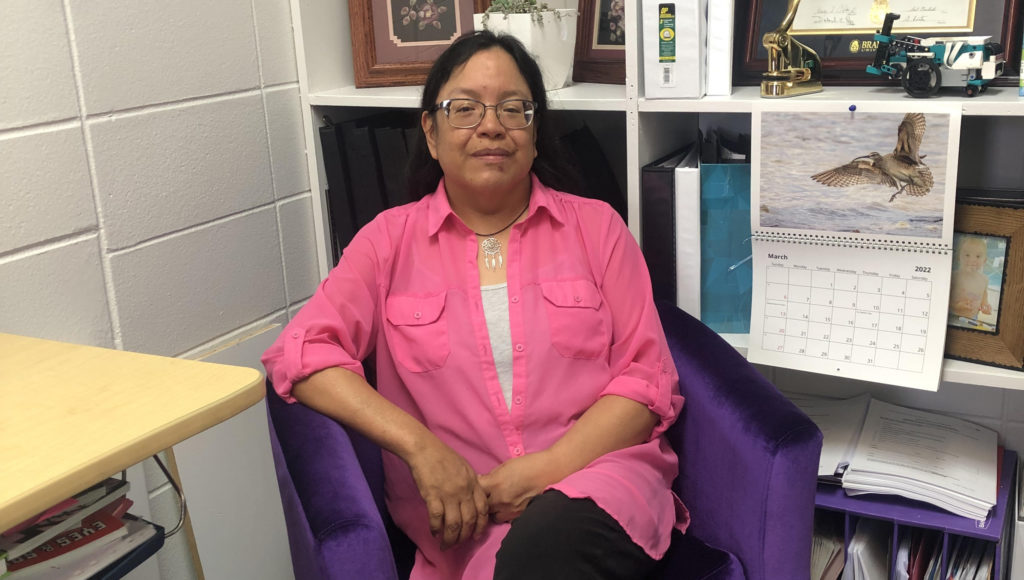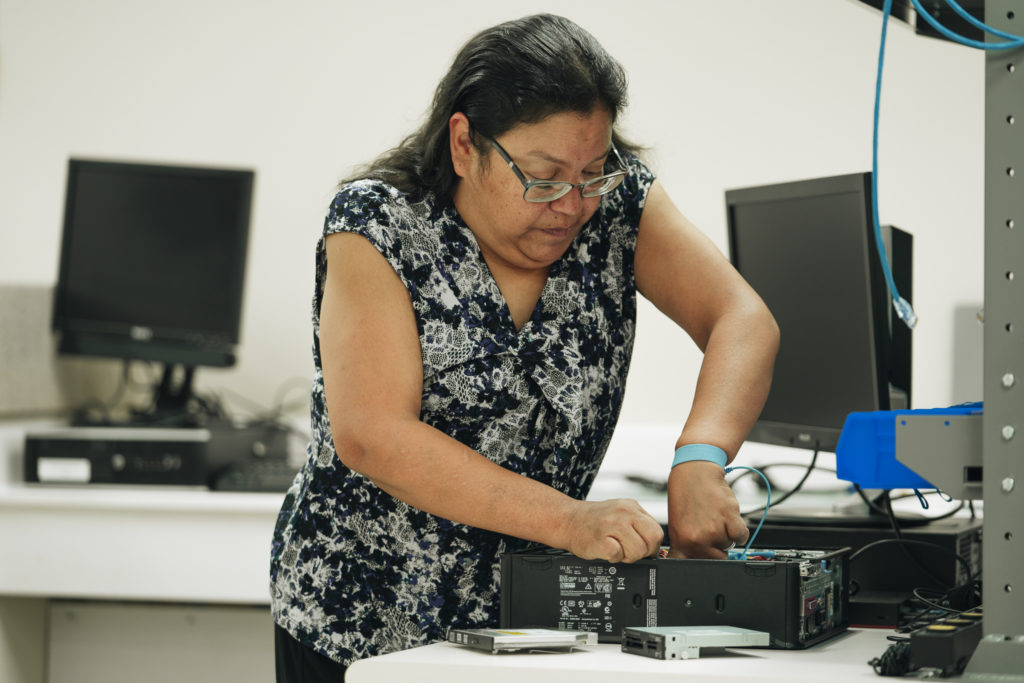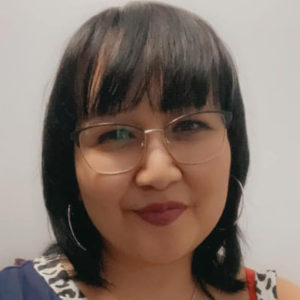
Brenda is an Indigenous woman and Sixties Scoop survivor who had a difficult childhood and struggled with school, housing and her identity. She enrolled in InTeRN, a skills development program that trains Indigenous women in digital and tech skills. FSC supports systems change through work-integrated learning that may be a model for other regions and underserved groups with similar geographic or cultural challenges in the north.
Brenda
InTeRN
Manitoba, Saskatchewan

 The Challenge
The Challenge
Brenda, 52, faced systemic barriers and had a low level of education and skills. She was born in northern Manitoba on the Opaskwayak Cree Nation and adopted as a toddler by a US family. Brenda endured challenges in school and the community before returning as a young adult to Canada, where she struggled with poverty and housing issues. Read her story here.
Like Brenda, many Indigenous people in rural Manitoba are dealing with cultural and educational hurdles, mental health challenges, food and housing insecurity. As well, Indigenous peoples have often faced discrimination in the school system and job market – obstacles that can feel overwhelming and lead to long-term disconnection from the workforce. Without skills and wraparound support, people continue to cycle in and out of poverty and social assistance, unable to access skills training or find work that allows them to remain in their home communities.
 Enter: InTeRN
Enter: InTeRN
Brenda joined the 10-month InTeRN program offered through University College of the North and supported by FSC. It provides training in Information and Communications technologies (ICT) to Indigenous women and youth, enhancing skills that enable them to pursue jobs as frontline technicians with Manitoba-based ICT industries. Featuring work-integrated learning and microcredential certification, the program delivers curriculum and tech training plus hands-on laptop computer servicing and repair work as a paid component of the program.
Wraparound supports such as mentorship, speakers, and counselling services enhance the culturally-appropriate approach, which is vital in keeping students engaged despite the barriers they face in pursuing full-time studies along with family and community obligations. The “sweetgrass” (Indigenous cultural and decolonization) component is key to engaging the students, who take responsibility for their learning, their workshops, and each other.
 The Result
The Result
Brenda has gained valuable tech skills and learned to build websites, repair and service computers. She has developed resilience through a supportive network of fellow students in this “sisterhood of tech” and is confident about her future.
More than 20 Indigenous women from northern Manitoba took the introductory, entry-level training, with six proceeding into the full-time InTeRN program.
Participants appreciate the program’s mutual support and strong bond that emphasizes peer collaboration and engagement. InTeRN has a retention rate of 87.5% and a completion rate of 75%, double that of other small UCN classes, and impressive given the barriers this population has to overcome.
This program has a retention rate of
87.5%
100%
of the graduates from the first cohort are now employed.
 The Impact
The Impact
All graduates from the first cohort are now employed. This project is an example of how FSC supports skills building and learning for underserved and marginalized populations with a holistic, culturally-informed approach that addresses systemic barriers.
Nurturing a local workforce of ICT professionals, the project enables students to find gainful employment in their own communities in future. They are qualified to pursue jobs as frontline technicians with Manitoba-based ICT industries that service the north, a region that lacks qualified local workers in the field. This upskilling can help industry to expand services into the north with more skilled tech workers.
InTeRN operates as a collaborative initiative with different partners, including education and industry, working together to create pathways for people distant from the labour market to enter the workforce and thrive.
This project is an example of how FSC supports skills building and learning for underserved and marginalized populations with a holistic, culturally-informed approach that addresses systemic barriers.
 What’s Next
What’s Next
InTeRN can serve as a model for other regions facing similar geographic and cultural challenges. The regional approach targeted to a local population promises greater potential for ICT jobs and service in remote regions.
Manitoba-based businesses continue to request partnerships with the project and encourage employment for the women with their respective companies. Graduates of the initial cohort are now moving into roles where they will continue to work with incoming cohorts of ICT-related students, demonstrating potential for northern residents to be employed in tech-related careers and serving as role models to others. Plans are in place to modify InTeRN and repeat it with another cohort of not only Indigenous women but open to all northern residents.
Organizers are also developing a program for Learning Technology Facilitators (LTFs) program in the north to gain upskilling to deliver ICT-related training to more people. This education model could be replicated in other sectors (e.g., pre-employment trades training, university degree programming) of UCN’s education and training sphere.
More Impact from Future Skills Centre
Supporting independence from social assistance
The Challenge Kate is a proud Inuit woman and single parent living in a remote community. Like many, she took programs to complete her high...
Accelerating the future of tech
The Challenge At age 16, Joshua was grappling with depression and dealing with challenges at home and school. Life felt overwhelming, and he dropped out...
Transitions from energy to tech
The Challenge Forty-six year-old Felipe Moreno was a mechanical engineer in the Calgary oil and gas sector for 15 years. After his company was bought...




